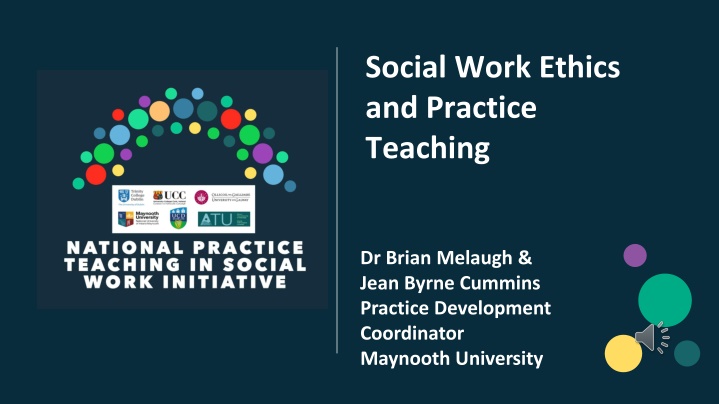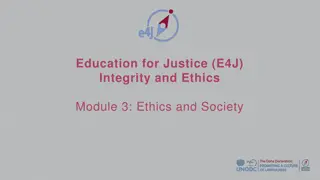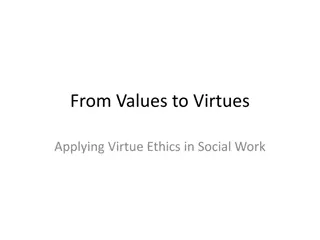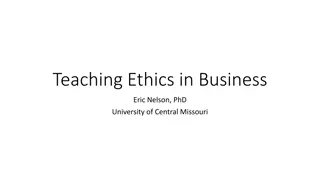Importance of Ethics in Social Work Practice Teaching
Social work ethics play a crucial role in the placement of students, ensuring they understand and adhere to ethical standards. This includes maintaining confidentiality, practicing non-discriminatory and culturally sensitive methods, setting professional boundaries, and supporting social justice and human rights. Graduates must reflect on their personal values and life experiences to manage their impact on professional practice effectively. The IFSW Global Social Work Statement of Ethical Principles guides social workers in upholding professional integrity and core values.
Download Presentation

Please find below an Image/Link to download the presentation.
The content on the website is provided AS IS for your information and personal use only. It may not be sold, licensed, or shared on other websites without obtaining consent from the author.If you encounter any issues during the download, it is possible that the publisher has removed the file from their server.
You are allowed to download the files provided on this website for personal or commercial use, subject to the condition that they are used lawfully. All files are the property of their respective owners.
The content on the website is provided AS IS for your information and personal use only. It may not be sold, licensed, or shared on other websites without obtaining consent from the author.
E N D
Presentation Transcript
Social Work Ethics and Practice Teaching Dr Brian Melaugh & Jean Byrne Cummins Practice Development Coordinator Maynooth University
Overview Why Social Work Ethics are Important for placement? Content to support you in your role as a practice teacher Exercises to support students to engage with ethics Resources to support you as a practice teacher
Requirements Standards of Proficiency (CORU, 2019) require students to demonstrate ethical awareness/action in a number of areas Be able to practise safely and effectively within the legal, ethical and practice boundaries of the profession Understand what is required of them by the Registration Board and be familiar with the provisions of the current Code of Professional Conduct and Ethics for the profession issued by the Registration Board Also requirements on for example -confidentiality, non- discriminatory and culturally sensitive practice, professional boundaries, commitment to social justice and human rights
Ethics and Values Ethics is the conscious reflection on our moral beliefs (Hinman, 2003). Graduates will understand and recognise the impact of personal values and life experience on professional practice and be able to take responsibility and manage impact appropriately (Standards of Proficiency for Social Workers, 2019, p.10) https://pediaa.com/difference-between-ethics-and-values/
Values Personal and Professional IFSW- Global Social Work Statement of Ethical Principles The statement reflects both personal and professional values they are related and indeed can complement and clash with each other This Statement of Ethical Principles (hereafter referred to as the Statement) serves as an overarching framework for social workers to work towards the highest possible standards of professional integrity. Implicit in our acceptance of this Statement as social work practitioners, educators, students, and researchers is our commitment to uphold the core values and principles of the social work profession as set out in this Statement. https://www.ifsw.org/global-social-work-statement-of-ethical-principles/
Social Work Ethics 1. Value base of the social work profession 2. Ethical Dilemmas in Social Work 3. Ethical Decision Making 4. Ethical Standards and Risk Management 5. Questions about the moral purpose of the profession (Reamer, 2014)
Ethical Dilemmas in Practice Dunk-West (2013) maintains to practice in social work means engaging with Ethical Dilemma/s and for students, these can be experienced as messy, complex and confusing for example, the limits of a service user s right to confidentiality and or self determination. For Banks (2001) Ethical dilemma/s involves making a choice between two equally unwelcome alternatives and it is not always clear which choice is correct.
Ethical Decision Making Ethical decision-making is an important process in professional practice, but difficult and complex, because it has to take into account the various ethical issues arising from the conflicting values and interests of those involved in the process (e.g. client, social worker and agency). Forming judgments for such decision-making is an ability that can be developed through professional experience, yet can and should be first taught and learned in social work classes. (Papouli, 2016) /
Frameworks for Ethical Decision Making-CORU Social Workers Registration Board, Code of Professional Conduct and Ethics (2019, p.29).
Supervision Banks et al (2021) refers the concept of Slow Ethics in essence taking time to stop, analyse, reflect and consider emotional responses in situations where ethics are under discussion. Slow Ethics is an appropriate model for supervision and encourages the Practice teacher to support students to engage with ethics, encouraging them to reflect on their responses, make links to CORU Standards of Proficiency 2019) and CORU Code of Ethics (2019) We encourage you to draw on some of the resources covered in this presentation to support student learning. In the next stage we introduce a framework for supervision created by Banks et al (2021).
Ethical Vigilance Being alert and sensitive to ethical dimensions of practice. Especially when under pressure Framework for Supervision Questions 1. What are the ethical issues in this situation? 2. Is there are danger of reacting to quickly because of work pressure Ethical Logistics The process of acting on ethical judgements/decisions. Ethical Vigilance Questions 1. How can we carry out the right course of action? 2. How can we promote the dignity of Service users even if the decision involves a constraining of rights? 3. How is informed, involved in the decision 4. How is the decision recorded? Ethical Reasoning deliberating and exploring how to balance different needs, rights responsibilities and risks Questions 1. What is the right approach or course of action in this situation? 2. How do we justify the decision 3. Can or is it possible to balance the rights and responsibilities of those involved? Three Fold Framework (Banks et al,2021) Ethical Logistics Ethical Reasoning
Resources to Learning Values https://www.viktorcessan.com/use-the-value-cards-exercise-to- help-your-teams-collaborate-better/
Resources to Learning Ethics Quiz to explore Ethical Style https://www.proprofs.com/quiz- school/personality/quizshow.php?title=nje5njyw&q=3 The quiz reflects the work of Carol Gilligan on ethical development (In a Different Voice, 1982) https://www- dev.masc.sc/SiteCollectionDocuments/Administration/et hic_style.pdf The purpose of the quiz is to explore the ethical perspectives of Justice and Care. These styles reflect the ethical schools of duty ethics (rules) and situation (context). The quiz reflects the concepts of You must (Justice) and You should (Care) in the CORU Code of Ethics (2019, p.5). The quiz is a playful way to engage with ethics and indeed to make links with practice and the code of ethics
Key readings / resources For further information on Ethics , these readings and resources will be of interest: 1. The Ethics Centre https://ethics.org.au/ 2. Banks et al (2021) Ethical Reflections In a Challenging Time (published by BASW) https://www.basw.co.uk/system/files/resources/ethical-reflections-in-challenging-times.pdf 3. Banks S (2018) Practising professional ethical wisdom: the role of 'ethics work' in the social welfare field https://dro.dur.ac.uk/26381/1/26381.pdf?DDD34+dss0sjb+d700tmt 4. An Introduction to Social Work includes sections on Ethics and Values, Personal values, Social work values, Ethics and professionalism free course offered by the Open University https://www.open.edu/openlearn/health-sports-psychology/social-care-social-work/an-introduction-social- work/content-section-2.3.3 5. Irish Association of Social Workers Code of Ethics and Code of Practice available from www.iasw.ie )
References Banks, S. (2012). Ethics and Values in Social Work. Basingstoke: Palgrave Macmillian Banks et al (2021). Ethical Reflections in Challenging Times: A resource for Social work practitioners and educators. Birmingham: BASW. Dunk West, P (2013). How to Be A Social Worker. Basingstoke: Palgrave Macmillian Papouli, E. (2016). Teaching and Learning for Ethical Practice in Social Work Education, in Routledge International Handbook of Social Work Education. London: Routledge Reamer, F.G. (2014). A Roadmap For Social Work Ethics. Banks, S. Ethics Bristol, Policy Press
Where can I get more information? Visit the National Practice Teaching in Social Work Initiative website for: 1. Information on becoming a practice teacher: Socialworkadmin@mu.ie / Jean.byrnecummins@mu.ie 2. More videos in this series 3. Resources, tools and readings on practice teaching in social work https://ucc.ie/en/nptswi/
Website: https://ucc.ie/en/nptswi/ Contact us: swfieldwork@ucc.ie Funded by the Department of Children, Equality, Disability, Integration and Youth (DCEDIY)























